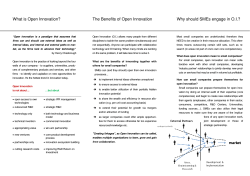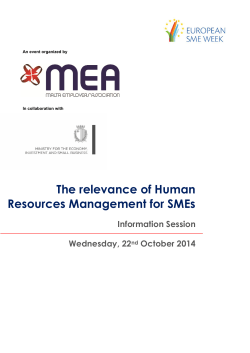
Stimulating Regional Cooperation for SMEs
From left to right, Samuel Kruiner, Eva Raute, Senior Consultant at GOPA; Dwight Tjin Kon Kiem and Kirsten Römer COSME Stimulating Regional Cooperation for SMEs “The regional aspect of the programme is its greatest strength and challenge…COSME is a programme that aims to stimulate regional cooperation between 12 Caribbean islands... Although they are near to each other geographically, each island has its own characteristics, obstacles and needs.” –Members of the Project Team To some, it might seem obvious: as the world becomes more interconnected, SMEs have greater possibilities to grow. They are able to provide their product to a larger market and therefore, have access to more capital. This, however, is not always the case and on many occasions, quite the opposite is true. The globalized world allows large businesses to get larger, putting SMEs, particularly those in smaller countries, at risk as large firms monopolize markets, offering products at a cheaper price because of the scale of their operations. 30 CURAÇAO BUSINESS | NUMBER 2 | 2015 It is becoming increasingly important that SMEs develop in their local market but also broaden their focus and look at markets beyond those in their own countries, expanding their potential market share and remaining competitive in a more inter-connected world. The roles of the government and local business support organizations, like chambers of commerce, are pivotal in these processes. Without adequate legal frameworks and mechanisms, tapping into a larger market can be an arduous process, where the costs outweigh the rewards. What is COSME? In recognizing these challenges, governments of countries, as well as inter-governmental organizations, are developing programmes to support SMEs, to help them to better integrate into the global economy. One example of this is COSME, a 15-million euro project funded by the European Union, which aims to contribute to the economic diversification and prosperity of Dutch, French and English Caribbean Overseas Countries and Territories and their respective SME’s. “Our most important goal is getting business owners to see the light at the end of the tunnel. We want them to get there, and in order to do that, we need to make a difference higher up the ladder.” – Sam Kruiner, Private Sector Development Expert The project caters to 12 island territories in total: Anguilla, Aruba, Bonaire, the British Virgin Islands, the Cayman Islands, Curaçao, Montserrat, Saba, Saint Barthelemy, Saint Eustatius, Sint Maarten, and Turks and Caicos. In order to provide the necessary support to SMEs, COSME’s aims are three-fold: • Provide technical assistance to Business Support Organizations (BSO’s), like the chambers of commerce, aiming to better connect with one another to promote regional collaboration for trade and investment relations, as well as to better serve their SME members. • Use BSO networks to reach out to local SME’s to better identify their needs so the programme staff can work with BSOs to address these needs, and improve SME competitiveness in international markets. • Work with governments and BSO’s to improve legislative and policy frameworks to facilitate the development of SMEs. The programme endeavors to facilitate regional cooperation and integration into the global marketplace for SMEs. To achieve this, the COSME team works closely with BSO’s and local governments to target the root of the problems, leading to a healthier business and investment climate and thus create more opportunities for SMEs to improve their competitiveness. The programme is implemented by the Deputy Regional Authorizing Officer (Ministry of Finance) of the British Virgin Islands and is supported by a team of GOPA Consultants (a company specializing in developing and transitioning economies). The technical team consists of three experts, two who are based in Tortola, BVI and one that is based in Curacao. There is a team leader, Diana Hendrickson-Fleming, and two private sector development experts, Dwight Tjin Kon Kiem for the Dutch islands, and Samuel Kruiner for the British and French islands. The project team meets regularly with a steering committee and representatives from all islands to ensure that they are heading in the right direction and that programme is implemented based on the general needs and requests of all relevant stakeholders. The goal is that the outcome of this program will allow business owners to see tangible changes that stimulate success in their respective companies. One specific intervention that will directly effect the SMEs is the OCT Direct Assistance Grant Scheme (see excerpt for specifics). What Makes COSME Unique? In many ways, COSME is the first regional project of its kind for SMEs. The regional cooperation aspect of the programme is something that the project team identified as both an obstacle to execution and the project’s greatest strength. They mentioned that regardless of the region’s small size, the situation on each island is different and complex. Therefore, there must be a consistent effort to tap into these different needs and resolve issues on the ground before looking at mechanisms for improved regional integration. In addition to just connecting the islands to one another, the programme also aims to connect these 12 islands to other inter-governmental organizations and platforms, such as the CARIFORUM, and the EU, through improving their connection to the EU Overseas Countries and Territories programme. The roots of the COSME Programme lie in an earlier programme that was implemented in the former Netherlands Antilles in the early 2000’s. The project, SESNA (Small Enterprises Programme Stimulation Netherlands Antilles) was also financed by the European Union. COSME can be seen as a regional version of SESNA, focusing on the opportunities for SME’s from the OCT in the entire region, and connecting BSO’s from the OCT across political and geographical boundaries. Opportunities for Curaçao For Curaçao specifically, COSME is an important step towards the global market. First of all, COSME will look to further refine and improve services provided by the BSO’s on the island, particularly the Ministry of Economic Development and the Chamber of Commerce. The programme will also look to improve current legislation to make it more business-friendly. Also, in terms of regional cooperation, COSME will attempt to better connect Curaçao not only other islands in the region, but also develop stronger ties with the European Union. Lastly, in an effort to reach out to local entrepreneurs, a grant scheme is created to stimulate certain activities and businesses on the island. The specifications of the grant schemes for SME’s is listed in a separate table in this magazine and more details are available on the website. All in all, COSME is another step in the right direction: putting Curaçao on the map, creating new opportunities for our business owners and stimulating economic growth and diversification within a region that has so much potential. Although each island is somewhat geographically isolated, the British poet, John Donne, said it best: “No man is an island,” and this is becoming truer with the permeability of economic, social and political borders. The world is indeed becoming smaller, and projects like COSME will ensure Curaçao’s smooth transition into the global economy through empowering our SMEs to be successful, stimulating the growth of our economy. CURAÇAO BUSINESS | NUMBER 2 | 2015 31
© Copyright 2025









